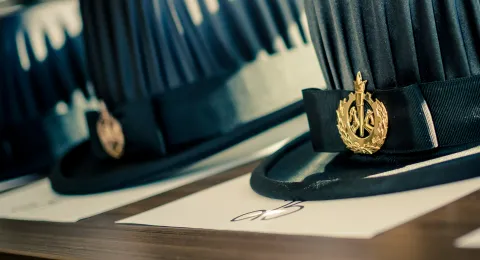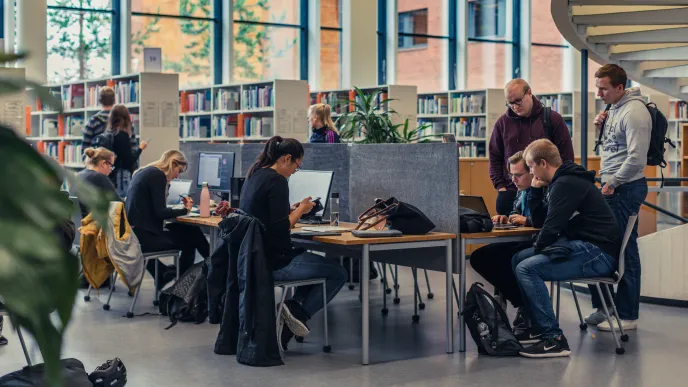The newsletter is your guide to what's happening on LUT campuses and the student community as well as to bachelor's and master's programmes updates and admission instructions. Newsletters will be delivered to your email once a month.
Each of LUT’s three schools has one doctoral programme which includes multiple fields of study. LUT grants students the right to postgraduate studies in a specific programme and field of study, which students determine in their application to postgraduate studies. If you are a Master’s student and you already know that you want to continue your studies, it is a good idea to discuss it with a professor – for example, the one guiding your thesis.
The most common route to doctoral studies begins by landing a junior researcher position at LUT. At this point, the person has already graduated from a Master’s programme either in technology or in business. Junior researchers need to apply for the right to postgraduate studies within their first year of work. This is necessary because writing a doctoral dissertation and doing the research for it is a crucial part of the junior researcher’s duties.
It is also possible to apply directly to become a doctoral student. However, in this case, applicants have to find an advisor for their doctoral dissertation before applying. Postgraduate students must have an advisor from the very beginning of their studies. They work closely together on the studies, research and publications.
Interview with a doctoral student from LUT
In this blog, we have interviewed Mohammad Reza Bilesan, a doctoral student from the LUT School of Engineering Science. He has previous degrees in Materials Engineering – B.Sc. in Industrial Metallurgy at IAU, Tehran Science and Research and M.Sc. in Characterization and Selection of Metallic Materials at the Iran University of Science and Technology.
When did you decide to apply to become a doctoral student? Why?
This is an interesting question. Since I graduated as an M.Sc. in 2016, I found myself more enthusiastic about continuing academic research. The experiences and knowledge I got during the Master’s studies made me more curious and creative than before about electrochemistry. New solutions are needed as the world’s issues are not resolved, and I felt like finding new feasible answers to current matters will fulfil me. I had different ideas and experiences regarding lithium electrodeposition, batteries, and casting sands recovery.
I applied to LUT in 2019 and was selected for an interview. After that, my current supervisor Eveliina Repo kindly decided to welcome me into her team. I have found the Separation Science department at LUT highly active and helpful in many aspects. The supportive academic research group enables me to work on my idea freely, which I have appreciated a lot.
What are you currently researching as a doctoral student?
These days, I am conducting a project named Re-Gold funded by the Academy of Finland. Dead, end-of-life computer motherboards are one of the fastest-growing streams which potentially threaten the environment.
Moreover, finding the most effective and affordable separation method to separate valuable metals is in high demand to eradicate the e-waste piling up in landfills. An estimated 50 million tons of e-waste is generated annually. Before the new restrict legislations, European countries exported their e-waste to China, India, and some African regions. Recently, governments have started considering urban mining as a critical part of the circular economy.
Interestingly, the gold concentration in e-waste is more than ten times that of gold mines. At this moment, we have achieved advancements in the mechanical separation of precious metals from e-waste through gravitational methods such as hydrocyclones. For instance, the tiny separated fraction at the end of the process contains over 24 times more gold than gold mines. Furthermore, by designing a new electrochemical advanced manufacturing method (3D printing), we are making gold recycling more efficient and environmentally friendly.
Therefore, the pile-ups in landfills can be considered as economic potential rather than health threats. In my opinion, the new cell design will not only be advantageous in gold recovery, but it can also be used in many aspects of electrochemistry. This affordable system will enable many small factories and business entrepreneurs to recycle. Hopefully, some of our achievements will be published in 2020.

What do you hope to do in the future?
At the moment, I am focusing on my doctoral studies because I see it as an opportunity to develop my skills deeply. Based on my background, I am more inclined to work in academia than industry. Therefore, I hope to complete my doctoral studies successfully and pursue a post-doctoral research career. However, the future is unpredictable.
In my opinion, this degree is a possibility for me to prove my potential and abilities. I can connect with more research networks from different universities and companies in this position, which inspires many ideas for our research. Different experiences in conferences, publishing scientific papers, and teaching assistance in this work will open new opportunities for me in the future.
Read more about doctoral studies at LUT.



